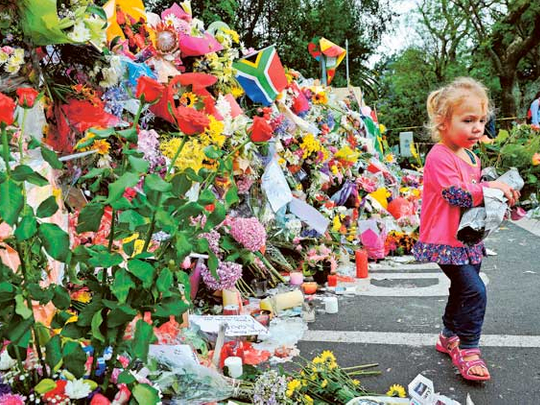
Dubai: As the world mourns former South African president Nelson Mandela’s death, his legacy as a leader is inevitably in the spotlight.
Some have recalled the words of his ex-wife, Winnie Madikizela Mandela, in an interview with the wife of author V.S. Naipaul in 2010.
“Mandela let us down. He agreed to a bad deal for the blacks. Economically, we are still on the outside. The economy is very much ‘white’. It has a few token blacks, but so many who gave their life in the struggle have died unrewarded,” Winnie was quoted as saying.
However, Mandela expressed his satisfaction that he played his role as a liberator when he said after retiring in 1999, “I am no longer in politics, I’m just watching from a distance when people come to me and say, ‘What do we do with a situation like this?’ I say, ‘No, go to people in politics, I am no longer in politics, I’ve retired’”
Here are five things that show Mandela did well in his mission as a liberator of all, not just black, people.
1) Left power willingly
South Africa’s people — Black, White, Indian, Malay and others of diverse origin — enjoy peaceful, free and fair elections because of a precedent set by Mandela. He fought in the liberation struggle, won elections and then handed over power peacefully. This may seem like no big deal but one needs only to look at the number of liberation icons in Africa and beyond who have become loathed dictators to understand the importance of this gesture. As president of the continent’s biggest economy, he could have stayed on and looted billions for himself, his family and comrades, but Mandela left willingly.
2) Did not tinker with the constitution
Maybe it’s because Mandela and fellow struggle icon Oliver Tambo were lawyers by profession. Or perhaps those who wrote it had the benefit of seeing where other post-independence constitutions had gone wrong. Whatever the case, South Africa has one of the best constitutions in the world today. However, the world has seen countless independence leaders changing constitutions to grant themselves absolute authority. This year, Zimbabweans voted for a new constitution limiting the president’s powers. Egypt is in the process of rewriting its own. All these are attempts to correct power-grabbing revisions done after independence. Once again, this was not so with Madiba. He left his intact, if not better.
3) Brought rights for all
At the time of Mandela’s death, South Africa is one of the few Muslim minority countries in the world planning to introduce Muslim personal law or Muslim family law to cater for Muslim citizens who requested such legislation. A few weeks ago, newspapers in South Africa reported the Western Cape High Court gave the Justice Minister a nine-month deadline to report on the progress made with the Muslim Marriages Bill. Of course, there is a big debate about why other minorities such as Sikhs and Hindus should not have their own special laws. However, that such progress is being made can be credited to Mandela’s legacy of fighting for the rights and dignity of all.
“I have fought against white domination, and I have fought against black domination. I have cherished the ideal of a democratic and free society in which all persons will live together in harmony and with equal opportunities,” the Nationalist said in his famous Rivonia Trial speech in 1964.
4) Kept fighting for other oppressed peoples
With a Nobel Prize (1993) sitting on his coffee table and his country finally liberated, Mandela could have considered his duty to his people well and truly done. But his sense of duty extended beyond his own country. He mediated in the genocide in Rwanda and Burundi, assisted efforts in the Democratic Republic of Congo and spoke out in support of the Palestinians among others.
On Friday, jailed Palestinian leader Marwan Barghuti wrote in an open letter: “You [Mandela] said: ‘We know too well that our freedom is incomplete without the freedom of the Palestinians.’
“And from within my prison cell, I tell you our freedom seems possible because you reached yours.”
5) Believed there is no freedom without freedom from poverty
“As long as poverty, injustice and gross inequality persist in our world, none of us can truly rest...overcoming poverty is not a gesture of charity. It is an act of justice. It is the protection of a fundamental human right, the right to dignity and a decent life,” the African leader said in a speech in February 2005, for the campaign to end poverty in the developing world, in London’s Trafalgar Square. South Africa still has a massive poverty gap. It is yet to solve the biggest question — ownership of land and resources. But the country’s citizens all have the right and responsibility to elect leaders who can correct whatever deficiencies exist. Mandela did his part. Others can carry on where he left off.












